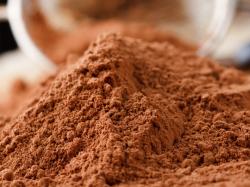Barry Callebaut Initiates Largest Sustainable Cocoa Program In Collaboration With Rainforest Alliance
June 25, 2013 | 4 min to read

Yaoundé/Cameroon, Zurich/Switzerland – Barry Callebaut, the world’s leading manufacturer of high-quality cocoa and chocolate products, has trained approximately 1,000 farmers from five cooperatives in the central and western regions of Cameroon in sustainable cocoa production, enabling them to become Rainforest AllianceCertifiedTM in just 10 months. This marks the first time that cocoa farmer cooperatives and not buying groups in Cameroon have achieved the independently verified Rainforest Alliancecertification. The group administrators received their official certificates which formalized their efforts.
On June 6, 2013 Barry Callebaut rewarded the cooperatives and farmers for their successful efforts. Farmers and cooperative management representatives as well as local area officials and delegates from government ministries participated in the ceremony hosted by SIC Cacaos, Barry Callebaut’s subsidiary in Cameroon.
“A vital step for sustainable cocoa production in Cameroon”
Barry Callebaut’s local training team comprising 15 people provides ongoing training and support to the participating farmers. Aurelie Oberti, Project Coordinator Cocoa Horizons, explains: “The certification standard includes economic, social and environmental criteria, and training is a vital step towards achieving sustainable cocoa production in Cameroon. We’re pleased to collaborate with Rainforest Alliance trainers in this process and to help the pioneering cooperatives to reach their ambitious sustainability goals.”
In addition to training the farmers in sustainable agricultural practices, Barry Callebaut helped the farmer groups to achieve cooperative status. “The aim is to strengthen the capacity of the farmer organizations and ultimately increase the number of farmers benefiting from the sustainability initiative. We are proud that the former farmer groups are now formally organized as certified cooperatives,” Oberti says.
The commitment in Cameroon is part of Cocoa Horizons, Barry Callebaut’s global cocoa sustainability initiative. “We could definitely rely on the experience we’ve gained in other Cocoa Horizons projects in Ivory Coast and bring the unique expertise to Cameroon, including the central region of Cameroon, which is known for its high quality non-smoky cocoa,” says Simplice Koné, Project Manager Cocoa Horizons Cameroon. “The purpose of the farmer training is to demonstrate sustainable practices and to convince farmers to apply these practices to their existing and future cocoa farms. Ultimately, our goal is to show farmers how good agricultural and environmental practices can help to increase yields and preserve the environment simultaneously,” he adds.
The certification training activities build on the success of Barry Callebaut’s own Quality Partner Program (QPP) with farmer cooperatives, started in Ivory Coast in 2005 and launched in Cameroon in 2010.
The Rainforest Alliance certification standard is based upon 10 principle covering economic, social and environmental aspects of farming and farm management, including the protection of natural resources such as native trees, water, and the soil; the management of waste and the recycling back into the farm of organic waste; the management of chemical inputs such as fertilizer and pesticide; and the provision of social measures such as access to schools and health care for the farmers’ and workers’ children and families. For more information on Rainforest Alliance: www.rainforestalliance.org.
Barry Callebaut’s commitment to sustainable cocoa:
“Cocoa Horizons” is a CHF 40 million cocoa sustainability initiative, which was launched as part of Barry Callebaut’s decision to make sustainable cocoa one of the four pillars of its corporate strategy. The aim of the program is to further boost farm productivity, increase quality and improve family livelihoods in key cocoa producing countries over 10 years. In fiscal year 2011/2012 alone, the company invested CHF 5 million in farmer training, infrastructure and community education and health programs. Barry Callebaut is focusing first on large producer countries including Côte d’Ivoire, Ghana, Indonesia, Cameroon and Brazil, and aims to expand the initiative to other cocoa producing countries with high development potential over the coming years.
One of Barry Callebaut’s landmark programs is the Quality Partner Program (QPP) through which the key goals of the Cocoa Horizons initiative are implemented on the ground in direct collaboration with cocoa farmer cooperatives, agricultural experts and government institutions. The program, which was founded in 2005, helps to train and support cocoa farmers to increase yields and quality and improve their livelihoods through higher income and improved access to education and basic health care. Over 30,000 cocoa farmers have benefited from the Quality Partner Program. www.qualitypartnerprogram.com
Barry Callebaut:
With annual sales of about CHF 4.8 billion (EUR 4.0 billion / USD 5.2 billion) in fiscal year 2011/12, Zurich-based Barry Callebaut is the world’s leading manufacturer of high-quality cocoa and chocolate – from the cocoa bean to the finest chocolate product. Barry Callebaut operates out of 30 countries, runs more than 45 production facilities and employs a diverse and dedicated workforce of about 6,000 people. Barry Callebaut serves the entire food industry focusing on industrial food manufacturers, artisans and professional users of chocolate (such as chocolatiers, pastry chefs or bakers), the latter with its two global brands Callebaut® and Cacao Barry®. Barry Callebaut is the global leader in cocoa and chocolate innovations and provides a comprehensive range of services in the fields of product development, processing, training and marketing. Cost leadership is another important reason why global as well as local food manufacturers work together with Barry Callebaut. Through its Cocoa Horizons initiative and research activities, the company engages with farmers, farmer organizations and other partners to help ensure future supplies of cocoa and improve farmer livelihoods.
Source: Barry Callebaut
